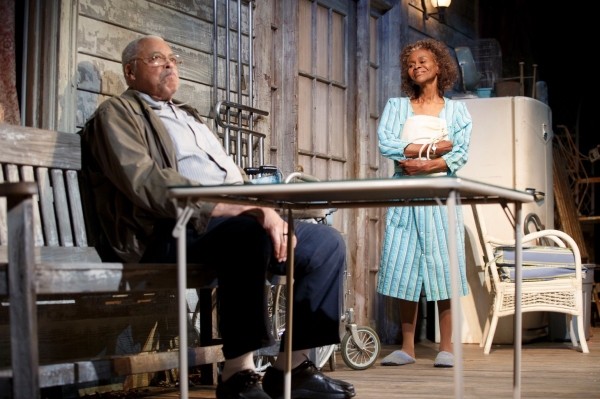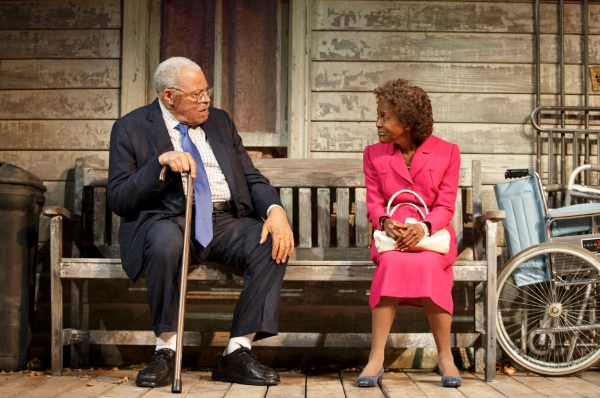
James Earl Jones and Cicely Tyson reunite onstage in lovely Broadway revival of THE GIN GAME (photo by Joan Marcus)
Golden Theatre
252 West 45th St. between Broadway & Eighth Ave.
Tuesday – Sunday through January 10, $57 – $141
thegingamebroadway.com
Life is like a game of cards in D. L. Coburn’s Pulitzer Prize-winning The Gin Game, back at its original Broadway home, the Golden Theatre, in a lovely revival starring James Earl Jones and Cicely Tyson. But it’s also a whole lot more complicated than that. Weller Martin (Jones) and Fonsia Dorsey (Tyson) have both recently moved into a nursing home to live out their final years. “Is there something wrong with you — if you don’t mind my asking,” Fonsia says. “Oh my, I should say so,” Weller replies. “I have one of the most advanced cases of old age in the history of medical science. The mortality rate’s incredible.” Over numerous games of gin on the ramshackle back porch, Weller, who fancies himself a card sharp, and Fonsia, who claims to not have played in a long time, slowly and carefully reveal details about their lives and their families, none of whom come to visit them. They are two old, lonely people brought together by circumstance; as they play gin, the other residents are inside, taking advantage of more of what the nursing home has to offer. “I don’t understand all this ‘entertainment,’” Weller says. “I’m talking about this constant need to entertain us. Sometimes I get the idea that they feel like if they don’t have a choir up there, or if they don’t have a goddamn magician up there doing tricks or something, then we’re all going to drop dead right in front of their eyes. En masse.” Weller is a big, blustery man whose cynicism and deep-seated anger seep into his card playing, especially when he continues losing games to the God-fearing, slim, and demure Fonsia, who doesn’t take kindly to his language. “You know, I never heard my father say a curse word in his life,” she explains, to which Weller responds, “Obviously you never played gin with him.”

Weller Martin (James Earl Jones) and Fonsia Dorsey (Cicely Tyson) play cards as a metaphor for life in THE GIN GAME (photo by Joan Marcus)
Coburn’s first play, The Gin Game sums up the whole of two people’s lives in clever, if at times sentimental and overly metaphorical, ways, while avoiding any easy, pat answers. At one point, Weller is not willing to accept that Fonsia’s success is just beginner’s luck. “I didn’t realize there was that much strategy to it,” she says. “There most certainly is. Anyone who tells you that gin is nothing but luck doesn’t know what the game is all about,” he says, referring to life as well. Riccardo Hernandez’s set is littered with broken-down sinks and refrigerators, old walkers and wheelchairs, but Weller and Fonsia are not ready for the garbage heap quite yet. Director Leonard Foglia (On Golden Pond, Master Class) sure-handedly makes a play that is mostly made up of games of cards mesmerizing and exciting, letting his stars do their stuff. (To see the cheat sheet Coburn created so the performers can keep track of the games, go here.) The two actors, who first worked together on Broadway nearly fifty years ago, in Roscoe Lee Browne’s 1966 show A Hand Is on the Gate, are sensational. The eighty-four-year-old Jones (You Can’t Take It with You, Gore Vidal’s The Best Man), who has won two Tonys, three Emmys, a Grammy, and a lifetime achievement Oscar, adds a complex sadness to Weller’s pomposity, his deep, mellifluous voice raising and lowering like a choreographed dance, while the ninety-year-old Tyson (The Trip to Bountiful, Sounder), who has won a Tony and three Emmys along with an Oscar nomination, is utterly charming and delightful as Fonsia, who turns out to be much stronger than she first appears. Both characters, despite their age, do some growing up during the course of the two-hour play, which has been previously performed by such pairs as Hume Cronyn and Jessica Tandy, E. G. Marshall and Maureen Stapleton, and Charles Durning and Julie Harris and won Tonys in 1977 for Best Play and in 1997 for Best Revival. (There is also a 2003 television adaptation starring Dick Van Dyke and Mary Tyler Moore.) The night I saw the show, both Jones and Tyson each had a moment when they accidentally dropped something. As they bent down to pick the items up, you could feel a tension build in the audience, wondering whether the actors would be able to do so without a problem. We should have had no such fears; it appears that there’s almost nothing this dynamic duo can’t accomplish.